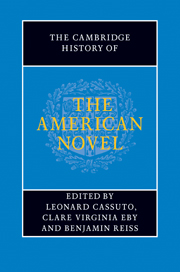Book contents
- Frontmatter
- General Introduction
- PART ONE INVENTING THE AMERICAN NOVEL
- PART TWO REALISM, PROTEST, ACCOMMODATION
- Introduction: realism, protest, accommodation
- 17 Realism and radicalism: the school of Howells
- 18 James, pragmatism, and the realist ideal
- 19 Theories of the American novel in the age of realism
- 20 The novel in postbellum print culture
- 21 Twain, class, and the Gilded Age
- 22 Dreiser and the city
- 23 Novels of civic protest
- 24 Novels of American business, industry, and consumerism
- 25 New Americans and the immigrant novel
- 26 Cather and the regional imagination
- 27 Wharton, marriage, and the New Woman
- 28 The postbellum race novel
- 29 The African American novel after Reconstruction
- 30 The rise of naturalism
- 31 Imagining the frontier
- 32 Imperialism, Orientalism, and empire
- 33 The hemispheric novel in the post-revolutionary era
- 34 The woman's novel beyond sentimentalism
- 35 Dime novels and the rise of mass-market genres
- 36 Readers and reading groups
- PART THREE MODERNISM AND BEYOND
- PART FOUR CONTEMPORARY FORMATIONS
- A selected bibliography
- Index
17 - Realism and radicalism: the school of Howells
from PART TWO - REALISM, PROTEST, ACCOMMODATION
Published online by Cambridge University Press: 28 July 2011
- Frontmatter
- General Introduction
- PART ONE INVENTING THE AMERICAN NOVEL
- PART TWO REALISM, PROTEST, ACCOMMODATION
- Introduction: realism, protest, accommodation
- 17 Realism and radicalism: the school of Howells
- 18 James, pragmatism, and the realist ideal
- 19 Theories of the American novel in the age of realism
- 20 The novel in postbellum print culture
- 21 Twain, class, and the Gilded Age
- 22 Dreiser and the city
- 23 Novels of civic protest
- 24 Novels of American business, industry, and consumerism
- 25 New Americans and the immigrant novel
- 26 Cather and the regional imagination
- 27 Wharton, marriage, and the New Woman
- 28 The postbellum race novel
- 29 The African American novel after Reconstruction
- 30 The rise of naturalism
- 31 Imagining the frontier
- 32 Imperialism, Orientalism, and empire
- 33 The hemispheric novel in the post-revolutionary era
- 34 The woman's novel beyond sentimentalism
- 35 Dime novels and the rise of mass-market genres
- 36 Readers and reading groups
- PART THREE MODERNISM AND BEYOND
- PART FOUR CONTEMPORARY FORMATIONS
- A selected bibliography
- Index
Summary
Perhaps no higher compliment can be paid to Mr. Howells than to state that those who undertake to write about Realism in America will inevitably find themselves dealing with it as though it were his private property, instead of with the doctrines and assertions of a system.
William Roscoe Thayer, “The New Story-Tellers and the Doom of Realism”(1894)Appearing in Forum, William Roscoe Thayer's critical essay on the rise and, to his mind, imminent fall of American literary realism neatly presages the scholarly tradition that would follow in his wake. From Thayer's time forward, literary critics have frequently treated “Realism in America” as though it were the “private property” of William Dean Howells, the novelist, editor, and critic who shaped the field of American letters from his positions at The Atlantic Monthly, Harper's Monthly, and Harper's Weekly during the final three decades of the nineteenth century. “And yet,” Thayer continues, “for a dozen years a horde of Realists, great and small, have been filling the magazines with their products and turning out an average of two novels a day.” From Thayer's vantage point, American literary realism seemed less like a private enterprise and more like a joint-stock company.
In their treatment of literary realism in the late nineteenth-century United States, Thayer's contemporaries and his critical heirs have validated Thayer's predication by neglecting the “horde of Realists” in favor of the figure of Howells. As much as has been written about Henry James, Mark Twain, Sarah Orne Jewett, or Stephen Crane – all of whom Howells considered realists – literary historians rarely address those figures as advocates for realism itself. Unlike these other major writers of the period, Howells left in his essays and reviews an archive of rough thinking that focuses, relentlessly, on the place of realist literature in the United States with a breadth and depth that has no equal among his contemporaries.
- Type
- Chapter
- Information
- The Cambridge History of the American Novel , pp. 289 - 303Publisher: Cambridge University PressPrint publication year: 2011



